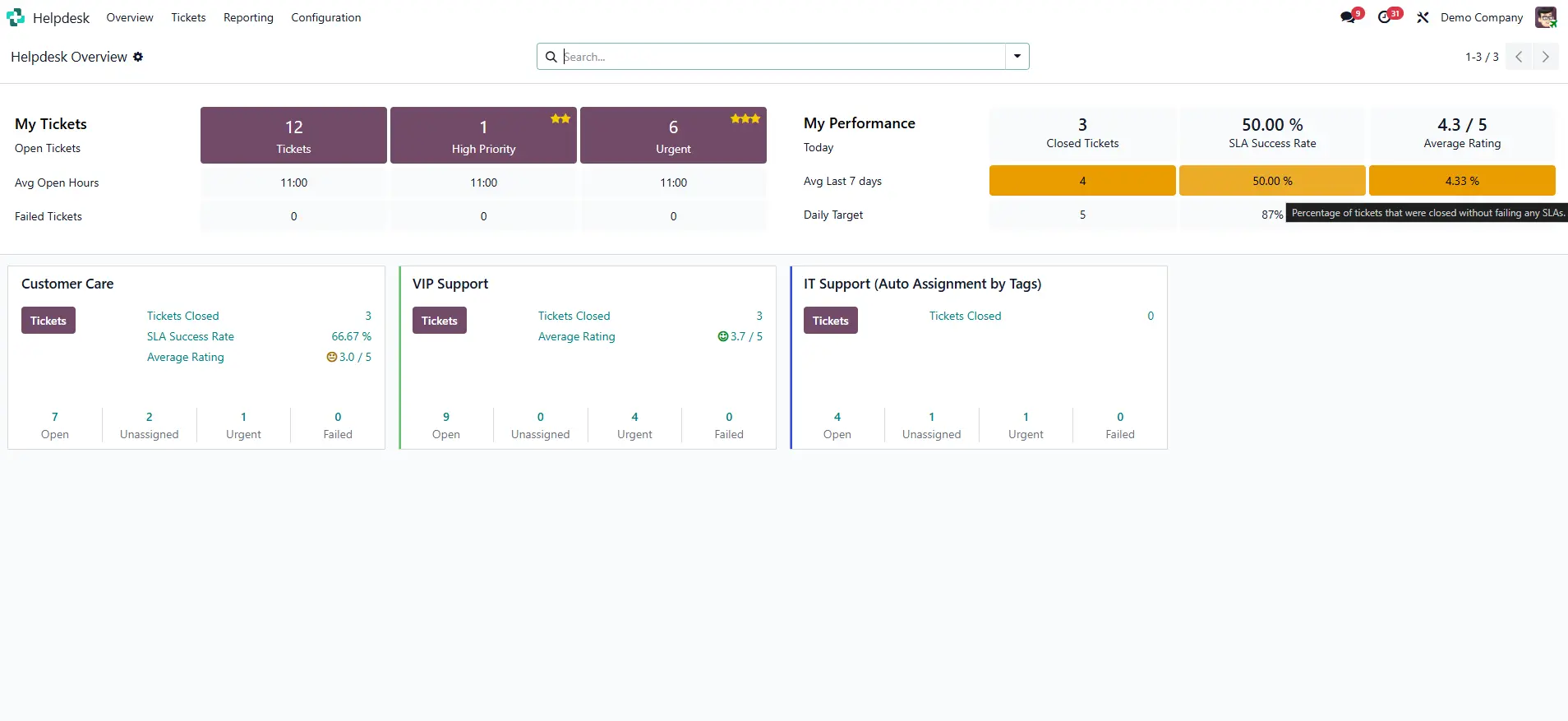Odoo Helpdesk (Support)
Managing support requests—whether internal or customer-facing—is a crucial challenge for any company aiming to deliver responsive, high-quality service. Odoo Helpdesk offers a comprehensive solution by centralizing tickets, simplifying their tracking, and automating key actions. Fully compatible with all Odoo modules, it integrates seamlessly into your organization and adapts to your workflows, regardless of your company’s size.
Why choose Odoo helpdesk?
For many companies, handling customer or internal requests can quickly become complicated without the right tool. Without a centralized system, tickets get scattered across emails, calls, messages, and more. This can lead to lost information, duplicates, and longer response times. The lack of visibility makes tracking difficult and undermines the quality of support.
To address this challenge, Odoo Helpdesk provides a comprehensive solution that consolidates all requests into a single platform, enabling you to:
- Track requests in real time
- Prioritize tickets based on urgency
- Prevent any requests from slipping through the cracks
This centralization gives your teams a clear, shared view, strengthening coordination both within internal departments and with external partners or service providers. It increases transparency, which enhances responsiveness and the overall quality of service.
Odoo Helpdesk stands out for its seamless compatibility with all Odoo modules, its flexibility, and its cost-efficiency. This module combines ease of use with a range of practical features, making it a smart choice for both small businesses and large organizations.

What are the key features of Odoo helpdesk?
Odoo Helpdesk’s features include essential tools that simplify request management, boost team responsiveness, and help deliver high-quality service. Here’s an overview of this module’s main capabilities.

Workflow and SLA automation
Odoo ticket management is made easier with automated rules: requests are automatically assigned to the right teams based on their type or priority, and actions can be triggered according to their progress.
The module also simplifies SLA (Service Level Agreement) management by setting clear response and resolution timeframes. Odoo Helpdesk tracks these commitments with visual alerts that keep teams informed of deadlines and help them act before a ticket exceeds its limits. Agents can also schedule activities on tickets to better organize their follow-up.
Customer portal
Odoo Helpdesk provides an online portal where customers can submit requests, track the progress of their tickets, and access helpful resources like FAQs or quick guides to resolve common issues.
Multichannel communication and live chat integration
The module handles requests from multiple channels: email, phone, web forms, and built-in live chat. No matter where they come from, all interactions are consolidated into a single ticket, preventing duplicates and information loss. The live chat also makes it easy to generate a ticket directly from an online conversation.
Support performance reporting and analytics
Odoo Helpdesk offers reporting tools to monitor team activity: number of tickets received and processed, average response and resolution times, SLA compliance, and satisfaction rates (when enabled). These reports help identify areas for improvement, spot recurring issues behind requests, and manage support operations based on real data.
Compatibility with other Odoo apps
As mentioned earlier, Odoo Helpdesk works seamlessly with other ERP modules: a ticket can be linked to a sales order (Odoo Sales), a project (Odoo Project), or even trigger a field service task (Odoo Field Service). This integration streamlines operations by eliminating double entry and ensuring consistent tracking of requests.
How does Odoo helpdesk interact with other Odoo modules?
Odoo Helpdesk is designed to work together with other Odoo modules. This integration ensures end-to-end tracking of requests, streamlines information sharing, and automates actions across departments.

Odoo CRM
Tickets are linked to customers, contacts, and CRM opportunities. This gives support teams quick access to the sales context so they can tailor their responses based on past interactions and ongoing opportunities.

Odoo Project
Tickets can be converted into project tasks or linked to existing projects. This interaction simplifies the handling of complex requests and ensures structured tracking without the need to re-enter information.

Odoo Field Service
When an on-site intervention is required, a ticket can directly generate a field service task. Technicians can access all relevant information before heading out, helping them deliver high-quality service.

Odoo Sales
Tickets are linked to existing quotes, orders, or subscriptions. This gives teams a complete view of commercial information, making it easier to handle warranties, product returns, or service contracts.

Odoo Invoicing / Accounting
Tickets can be linked to invoices, credit notes, or payments. This allows agents to quickly check payment status and respond more efficiently to accounting-related inquiries.

Odoo Live Chat
Conversations from live chat are converted into tickets complete with the full exchange history. This way, agents retain all context, and customers don’t have to repeat their request with each new representative.

Odoo VoIP
Calls linked to a ticket automatically display the full history of prior interactions as soon as they’re answered. This enables agents to handle requests faster and with greater accuracy.

Odoo Website / eCommerce
Tickets are connected to orders placed on the e-commerce site or through the customer portal. This simplifies processing returns, complaints, and warranty claims by centralizing all necessary information.

Odoo Inventory
Teams can check stock levels in real time and directly manage requests for returns, exchanges, or product availability. This reduces unnecessary back-and-forth and speeds up customer responses.

Odoo Studio
With Odoo Studio, you can tailor Odoo Helpdesk to your company’s specific needs by adding custom fields, automation rules, or personalized screens—no complex development required.

Odoo Timesheets
Time spent on tickets is automatically recorded in timesheets, enabling analysis of effort invested and simplifying billing for support services when needed
What are the use cases for Odoo helpdesk?
Odoo Helpdesk covers a wide range of scenarios, supporting both customer service and internal request management.
External customer support (after-sales service, post-sale assistance)
Your teams have a centralized tool to manage complaints, technical questions, and post-sale follow-up. Requests are handled more efficiently, ensuring a responsive and high-quality service.
Internal support (IT, maintenance, HR)
Helpdesk is also suited for internal use, enabling IT, maintenance, and HR teams to track employee requests, prioritize them, and resolve issues within controlled timeframes.
Warranty and product return management
Each ticket can be directly linked to the related order or product, helping teams handle returns and warranty claims with accuracy and efficiency. For example, when a customer reports a defect, support staff can instantly access the purchase date, serial number, and warranty terms—streamlining and speeding up the process.
Technical support for subscriptions or services
The Odoo Helpdesk module simplifies tracking requests related to active subscriptions and services. Your teams can respond promptly and ensure uninterrupted delivery of services to customers.
On-site service tracking
Requests requiring a site visit can directly generate field service tasks. Information is shared between office teams and technicians, ensuring smooth coordination and seamless tracking of interventions.
Why choose Captivea for your odoo Helpdesk integration?
Implementing Odoo Helpdesk requires a solid understanding of your business needs and the specific challenges of both internal and external support. Captivea supports you at every stage of the project—from needs analysis to configuring workflows, SLAs, and automations—to deliver a tool perfectly tailored to your processes.
Our certified Odoo experts provide custom integrations that simplify adoption by your teams and ensure a smooth user experience. We guarantee deployment that follows best practices along with responsive support.

Take control of your request workflows with Odoo helpdesk
Centralize, prioritize, and track all your requests for more efficient support and higher customer satisfaction.
Odoo GOLD PARTNER |
Worldwide ERP solution |
Based Cloud ERP Solution or On Premise ERP Solution |
Prices per users |
Adapted for small businesses and mid-market businesses |
+40 000 apps availables on Odoo Marketplace |
Discover Odoo ERP Schedule an Odoo Demo |
Frequently asked questions
Portal users can access their tickets via the website portal. They can view ticket statuses, add comments, and track progress through a dashboard that shows both open and closed tickets assigned to them.
To create a new team, go to the team management section, click “Create,” and add members. Assign tickets to teams based on categories or expertise to streamline workflows and improve response times.
Creating a new stage means defining ticket statuses for progress tracking. The kanban view allows users to drag and drop tickets between stages, providing visual clarity and helping teams prioritize their work.
The Odoo Community Association encourages collaborative development by funding projects and involving nonprofit organizations, ensuring widespread use and continuous improvement of Odoo features like Helpdesk.
Yes, both list view and kanban view let you filter and track closed tickets. Teams use dashboards to analyze ticket resolution rates and workload distribution, improving support efficiency.
Odoo Helpdesk offers customizable email templates that teams can create and preview before sending. These templates automatically notify users when ticket statuses change or updates are added.
Users create tickets through the portal or email. During creation, tickets can be assigned to relevant teams automatically, ensuring quick response and better organization.
Yes, teams can preview email templates to ensure accuracy and clarity before sending, enhancing communication with portal users.
Dashboards provide a real-time overview of ticket statuses, including assigned and closed tickets. This visibility helps teams identify bottlenecks and allocate resources efficiently.
Portal users have access to detailed ticket descriptions and can see which teams are assigned. This visibility improves transparency and user satisfaction.








